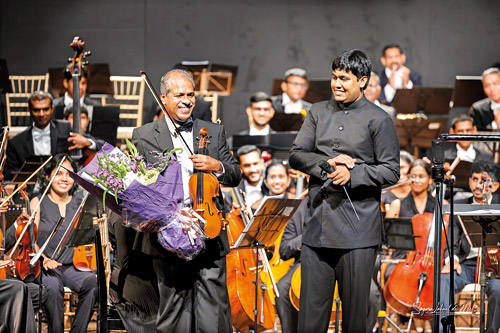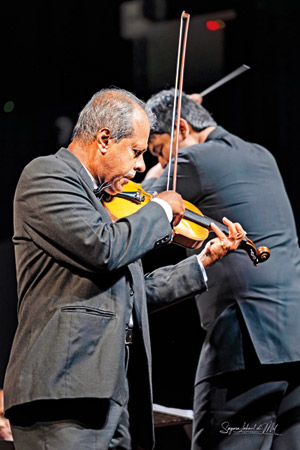Bouquet to Gustav Mahler Orchestra for well-executed challenging programme
View(s):
Ananda Dabare and Srimal Weerasinghe: Taking a bow. Pix by Sagara Lakmal de Mel
Expectations were high at the 2024/25 season opening concert of the Gustav Mahler Orchestra of Colombo on June 15, at the Lionel Wendt Theatre, Colombo. This after a strenuous concert on May 31, at the Dutch Reformed Church, Galle. Performing two very challenging programmes in a short span of two weeks gives reason for eyebrows to be raised. Could young conductor Srimal Weerasinghe meet that challenge?
I am not writing a review or critique of a concert by an orchestra now in its sixth year that carries the name of an Austro-Bohemian Romantic composer “Gustav Mahler”, but as a listener of his music. At the school-going age in the late 1970s we, a group of friends, were able to sit through Mahler-Symphonies without any idea of the great masters of Western classical music. It was the “Adagietto” of Mahler’s fifth symphony which opened and closed Luchino Visconti’s film “Death in Venice” (1971) that opened us up to this kind of “heavy music”. The film ran just for one week at the Liberty, and each time the same music lovers were seen at the cinema.
Music history records that US American orchestras too shunned Mahler till Leonard Bernstein opened the ears through his Mahler-Bernstein cycles. His lectures in the 1960s addressed young people. The same young teenagers who questioned puffed-up academic traditions were later to become hard core Mahler fans.
The evening at the Lionel Wendt on the 15th opened with three challenging works for violin with maestro Ananda Dabare performing Tchaikovsky’s ‘Souvenir d’un lieu cher’ (Memory of a dear place), first performed in 1878. The music brought back memories of Dabare playing Tchaikovsky’s Violin Concerto with the Gustav Mahler Orchestra of Colombo. Both works were composed in the same phase of the composer’s life. His ability to interpret Tchaikovsky and the orchestra’s competence to support him was evident.

Capturing the mood: Ananda Dabare
The sombre “Russian mood” was captured by the strings right from the opening two bars, which the soloist was able to sustain throughout. Camille Saint-Saëns’ ‘Introduction and Rondo Capriccioso’ came next exploring another technique of the violinist’s virtuosity to handle cadenza-like passages with ease and blend the more playful dance-like sections perfectly, with utmost clarity maintained in the highest and lowest notes. It was a formidable task for the conductor to accompany the very emotional piece full of fluctuating tempi, which he most masterly caught up in the tutti. All phrases and accents of the solo’s melodic lines were meticulously studied and interpreted.
Nobody at the Lionel Wendt needed a translation of what ‘Ziegeunerweisen Op 22’ by Pablo de Sarasate meant. The gypsy kind of music that entered the concert hall through Franz Liszt in the late 19th century too is full of emotions. It was the most challenging piece for violin that evening. This third piece was Dabare at his best. It may have been a coincidence that the evening at the Lionel Wendt opened and closed with concert hall favourites premiered in 1878.
We are thankful for the players of the Gustav Mahler Orchestra for showcasing Dabare’s virtuosity in the mature phase of his musical career. I often see him sitting with very young violinists, which a senior maestro of his calibre would not do.
What next? Beethoven’s Fifth Symphony.
My experience of listening to renowned professional orchestras in Berlin in the years 1983-1996 is that they perform a repertoire of Mozart’s ‘Jupiter’, Beethoven’s ‘Pastoral’ or Schubert’s ‘Unfinished’ without rehearsals. Such Wunschkonzert (request concert) favourites pull in the crowds. These “evergreens” are often placed after the interval that is after the orchestra has battled through a 20th century work. Frankly, I thought this interpretation at the Lionel Wendt too would fade off in my memory on leaving the hall. What made this rendering remarkable, was that the main theme of the slow movement accompanied me all the way home.
Srimal’s introduction to the work was not in vain. He was able to pinpoint features of this well-known symphony, which the young musicians illustrated to the audience. The melodies, their variations and the beats, thus introduced shone out when the symphony was played. The brass of the orchestra under the guidance of Vidhurinda Samaraweera was able to play with passion. It is remarkable that a young boy was given the solo oboe part, which he was able to interpret under the conductor’s guidance. One must commend the conductor and the concert masters for taking the responsibility of grooming the very young members of the orchestra. Maybe much of rehearsal time and patience is devoted for this training. At a young age, when being a “Dream Star” in a reality show is the highest aspiration, it is remarkable that the Mahler Orchestra is able to sustain a core of passionate musicians that is enthusiastic to take up challenges.
The West-Eastern Divan Orchestra was conceived in 1999 inspired by the Argentinian-Israeli musician Daniel Barenboim and the late Palestinian professor Edward Said. It started as a music workshop where young musicians from Israel and the Arab countries of the Middle East could develop their musical skills in an environment of coexistence and cultural enrichment. Many a veteran concertgoer boycotted the early performances of this youth orchestra questioning if “Arabs could understand western music”.
Is it not a pity that our concertgoers who were nurtured with Haydn Symphonies in the ’70s and ’80s will not come to terms with the idea that Sinhala-speaking musicians can play Western classical music.
Srimal and his orchestra seem to be dedicated to performing Antonin Dvorak’s ‘From the New World’, Mahler’s Fourth Symphony, Richard Wagner’s ‘Siegfried Idyll’ and Rimsky-Korsakov’s ‘Russian Easter Festival’ without any stage fright, offering us a wide palette of late 19th century European music. The orchestra the youngest in Sri Lanka, a country which has a rich tradition of music, has even taken the challenge of performing Mahler’s Fourth Symphony for the first time in South Asia. The orchestra has also devoted time and effort to performing music of Sri Lankan composers including our own Harsha Makalanda’s ‘Swarasanga Vannama’ in 2019, Dr Lalanath de Silva’s Christmas Oratorio, Lakshan Perera’s Mass in C Major (first-ever complete Latin mass composed by a Sri Lankan), and Shanon Jacob’s Romeo and Juliet.
Some might say that the members of the Gustav Mahler Orchestra of Colombo are a bunch of “fools who rush in where angels fear to tread” but, in the short span of six years they have educated Colombo audiences on late Romantic music. To me, they are an orchestra experimenting with genres, musical traditions, and audience building. Judging by their very short performance history, mentors, conductors and concert masters one may see that they are conscious of the role they must play, locally and internationally.
-Dr. Asoka de Zoysa
(A retired Professor in German Studies, University of Kelaniya, Dr. de Zoysa was inspired to write his Master’s thesis by the poetry of Friedrich Rückert. Rückert was one of Gustav Mahler’s favourite song writers).
Searching for an ideal partner? Find your soul mate on Hitad.lk, Sri Lanka's favourite marriage proposals page. With Hitad.lk matrimonial advertisements you have access to thousands of ads from potential suitors who are looking for someone just like you.


